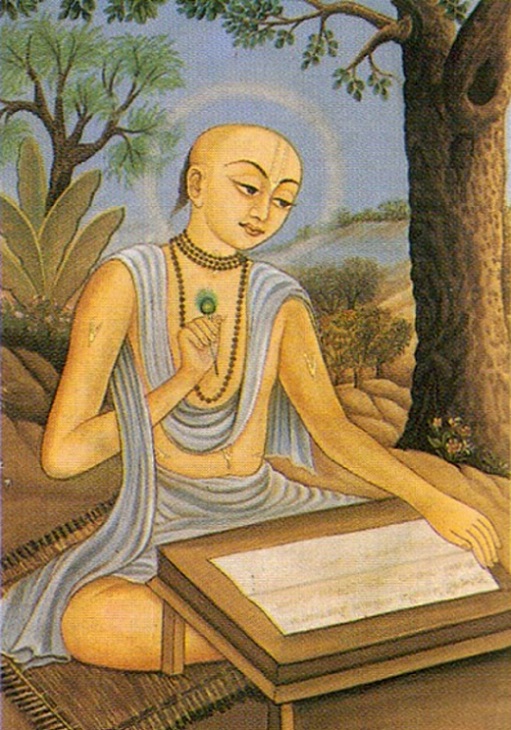(Srila Jiva Gosvami)
Prabhupāda: He (Jīva Gosvāmī) is one of the very important ācāryas in our sampradāya, so especially his Sandarbhas should be discussed. If there is no such book, then the following discussion may be, take place.
Śrīla Jīva Gosvāmī was a brahmacārī, he left his home at the age of 10 to 12 years. His father and two elder uncles, they left home. His father was Vallabha, and his elder uncles, Sanātana and Rūpa, or Sākara Mallika and Dabira Khāsa. So, they were all government servants, but after meeting Caitanya Mahāprabhu they decided to retire from the service, and three of them retired. Out of that, Sanātana Gosvāmī was very important officer.
The Nawab did not like his retirement so he interned him, not allowed him to go out of home. But Rūpa Gosvāmī and his younger brother, Vallabha, they left home, and they left instruction also to Sanātana Gosvāmī, that there is some money for his release, he could utilize that money. So Rūpa Gosvāmī and Vallabha left home prior to Sanātana Gosvāmī's leaving home. So, Rūpa Gosvāmī and Vallabha met Lord Caitanya at Prayāga—these things are mentioned in our Teachings of Lord Caitanya—you can read, teachings to Sanātana Gosvāmī and Rūpa Gosvāmī and their meeting with Lord Caitanya at Allahabad, Prayāga.
So this boy, Jīva Gosvāmī, when he saw that his father and uncles all left home, why he should remain at home? So he also left, and he first of all went to Benares, which is called Vārāṇasī. It is a great center for learning Sanskrit. So he finished his education in Sanskrit grammar, specifically, he was a great scholar in Sanskrit grammar. According to Vedic system, the students are first of all taught the Sanskrit grammar, because it is very difficult subject.
Usually one has to study grammar for 12 years, and when one is very much conversant with grammatical rules, he can read any literature. That means after studying grammar, the door is open for any other subject matter, just like philosophy, medicine, then military art, there are so many Vedic knowledges. Generally they read literature, the Purāṇas, the Vedāntas and śaipa(?), śaipa(?) means general literature. So Śrīla Jīva Gosvāmī became a great scholar in grammar and then he studied all Vedic literatures, and after that he approached his uncle Rūpa Gosvāmī in Vṛndāvana. He became a disciple of his uncle by proper initiation and remained with him. He was assisting his uncle and after hearing from him he composed very scholarly books know as Ṣaṭ-Sandarbha.
These Ṣaṭ-Sandarbha are recognized as the most scholarly work in the world. There is no comparison of his philosophical approach to the Vaiṣṇava school. Generally, the impersonal Brahman is discussed there, then Kṛṣṇa is discussed there, Bhāgavata is discussed there, love of Kṛṣṇa is discussed there. In this way, all subject matter, very elaborately discussed in Ṣaṭ-Sandarbha. That is his, the greatest gift (of) Śrī Jīva Gosvāmī. And one of the Sandarbha thesis is Krama-sandarbha, his comment on Śrīmad-Bhāgavatam.
So Jīva Gosvāmī was so big scholar but sometimes one ordinary scholar, he approached Rūpa Gosvāmī that "I want to discuss with you about śāstra." Rūpa Gosvāmī could understand that this man is not a devotee, he will simply waste my time. He inquired from him, "What is your purpose of discussing with me about śāstras?" He said that "I have discussed śāstras with many big scholars and I have come victorious, so if I come victorious by discussing with you, then I will have very good fame and name." So Rūpa Gosvāmī could understand his view or his ambition, that "this man is a materialistic man, he wants some name and fame," so he told him, "All right, without discussing, if I give you certificate that I am defeated, will that do?" So, he said, "Yes, that will do."
So he gave him in writing that "I had śāstric discussion with this man, and I found myself very much inferior and defeated." So he was very glad to take that certificate, but when he was going, Jīva Gosvāmī saw, "My dear sir, what is that paper you have taken?" "No your uncle has agreed that he was defeated, so I have got this certificate, I am going."
So he said, "All right, let me see what he has written." So he gave him, and he kept that paper, and then he invited that "you have defeated my uncle, but you can discuss with me also." So he agreed. So he was defeated. He was defeated and the matter was informed to Rūpa Gosvāmī, that "Your nephew and your disciple, Jīva Gosvāmī has defeated that learned scholar." So Rūpa Gosvāmī became a little angry superficially, that "Why did you bother? He was taking..."
So some people say that Jīva Gosvāmī was rejected on this ground by Rūpa Gosvāmī, but that is not a fact. He was very glad that Jīva Gosvāmī defeated him, but he superficially said, "Why should you take so much trouble and bother? He might have gone with that certificate." But it is the duty of the disciple that even the spiritual master, or senior ācārya, they agree to be defeated, it is the duty of the disciple to see that his spiritual master and superior is not defeated.
That is the instruction we get from Jīva Gosvāmī's behavior. This is one of the important... and later on when Jīva Gosvāmī established the Rādhā-Damodara temple in Vṛndāvana, but he had no sons because he was brahmacārī, so some of his gṛhastha devotee was entrusted with the management of the Rādhā-Damodara temple, and they are still going on by their descendants.
(Srila Prabhupada Conversation - Vaisnava Calendar Description - Vrindavan, March 11, 1972)
.

